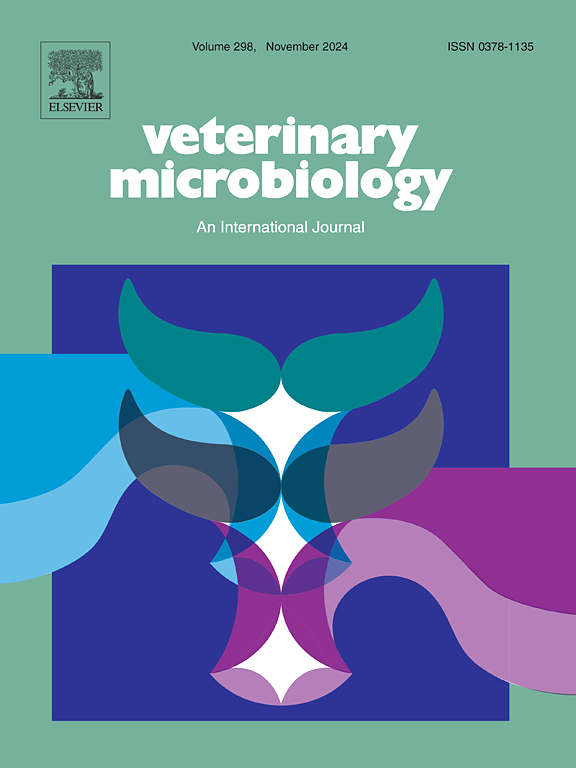Transferrin receptor 1 is an entry factor for Japanese encephalitis virus
IF 2.7
2区 农林科学
Q3 MICROBIOLOGY
引用次数: 0
Abstract
Japanese encephalitis virus (JEV) is a zoonotic pathogen that can be transmitted to humans and animals via arthropods, causing viral encephalitis. In this study, we investigated the role of transferrin receptor 1 (TfR1) in JEV infection. We found that knocking down TfR1 expression in A549 and HeLa cells significantly inhibited JEV entry, while overexpression of TfR1 in 293 T cells enhanced viral entry. The JEV E protein interacts with TfR1, specifically via the protease-like domain (residues 384–606). Additionally, the hTfR1 soluble ectodomain protein significantly blocked JEV infection in HeLa cells, and ferric ammonium citrate (FAC), an iron supplement, downregulated TfR1 expression and effectively inhibited JEV entry and infection. These findings identify TfR1 as an entry factor for JEV and a potential antiviral target, suggesting that small molecule inhibitors like FAC could offer a promising antiviral strategy.
转铁蛋白受体1是乙型脑炎病毒的一种进入因子
日本脑炎病毒(JEV)是一种人畜共患病原体,可通过节肢动物传播给人类和动物,引起病毒性脑炎。在这项研究中,我们研究了转铁蛋白受体1 (TfR1)在乙脑病毒感染中的作用。我们发现,敲低A549和HeLa细胞中TfR1的表达可显著抑制JEV的进入,而293 T细胞中TfR1的过表达可增强病毒的进入。JEV E蛋白与TfR1相互作用,特别是通过蛋白酶样结构域(残基384-606)。此外,hTfR1可溶性外结构域蛋白显著阻断JEV在HeLa细胞中的感染,铁补充剂柠檬酸铁铵(FAC)下调TfR1表达,有效抑制JEV的进入和感染。这些发现确定TfR1是乙脑病毒的进入因子和潜在的抗病毒靶点,这表明像FAC这样的小分子抑制剂可能提供一种有希望的抗病毒策略。
本文章由计算机程序翻译,如有差异,请以英文原文为准。
求助全文
约1分钟内获得全文
求助全文
来源期刊

Veterinary microbiology
农林科学-兽医学
CiteScore
5.90
自引率
6.10%
发文量
221
审稿时长
52 days
期刊介绍:
Veterinary Microbiology is concerned with microbial (bacterial, fungal, viral) diseases of domesticated vertebrate animals (livestock, companion animals, fur-bearing animals, game, poultry, fish) that supply food, other useful products or companionship. In addition, Microbial diseases of wild animals living in captivity, or as members of the feral fauna will also be considered if the infections are of interest because of their interrelation with humans (zoonoses) and/or domestic animals. Studies of antimicrobial resistance are also included, provided that the results represent a substantial advance in knowledge. Authors are strongly encouraged to read - prior to submission - the Editorials (''Scope or cope'' and ''Scope or cope II'') published previously in the journal. The Editors reserve the right to suggest submission to another journal for those papers which they feel would be more appropriate for consideration by that journal.
Original research papers of high quality and novelty on aspects of control, host response, molecular biology, pathogenesis, prevention, and treatment of microbial diseases of animals are published. Papers dealing primarily with immunology, epidemiology, molecular biology and antiviral or microbial agents will only be considered if they demonstrate a clear impact on a disease. Papers focusing solely on diagnostic techniques (such as another PCR protocol or ELISA) will not be published - focus should be on a microorganism and not on a particular technique. Papers only reporting microbial sequences, transcriptomics data, or proteomics data will not be considered unless the results represent a substantial advance in knowledge.
Drug trial papers will be considered if they have general application or significance. Papers on the identification of microorganisms will also be considered, but detailed taxonomic studies do not fall within the scope of the journal. Case reports will not be published, unless they have general application or contain novel aspects. Papers of geographically limited interest, which repeat what had been established elsewhere will not be considered. The readership of the journal is global.
 求助内容:
求助内容: 应助结果提醒方式:
应助结果提醒方式:


